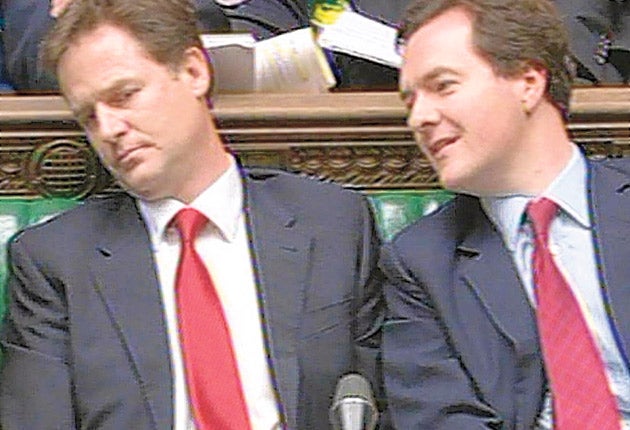John Walsh: Why does Citizen Service sound so sinister?

So, National Service is back. Obviously not real National Service, where every chap in the nation is required by law to undergo 24 months of military training, square-bashing and army manoeuvres, under the baleful eye of a sergeant-major, as was the case from 1947 to 1960.
The National Citizen Service, launched yesterday, is, we're assured, nothing like that. It's about bringing together 16-year-olds from "different backgrounds" to become "community volunteers" mucking in together for the good of all: spending one week in "challenging outdoor pursuits," one week living together in residential homes working in "sports coaching and film-making projects", and a final week dreaming up ideas that would "make a difference in their local community".
David Cameron has been harping on about this since 2005, before he became Tory leader, and he never makes it sound innocent. "I want to see a programme which engages young people and gives them a sense of purpose, optimism and belonging," he says. "Something like National Service, but not military, not compulsory but universal."
Not compulsory but universal? How can it be universal if it's not compulsory? Will all the 16-year-olds in the country volunteer spontaneously? And for all his attempts to present the scheme as a jolly, inclusive, kids-together enterprise (Swallows and Amazons and Hoodies, The Famous Five Make A Movie With Some Local Oiks), weasel words keep escaping his cautious presentation.
"So many young people are lost," he sighed back in April, during the election campaign. "Show me a bus stop that's been bashed up, and I'll show you ... someone who has a lack of discipline in their life." Discipline, eh? So his scheme is to be universal, and about discipline, rather than mucking about in canoes? In April, the Service was supposed to last for eight weeks, cleverly filling up the school holidays of troublesome youths, requiring them to work on a "social action project". Now the project's been pared back to three weeks. One might legitimately wonder what is in Cameron's mind that he hasn't told us about.
About supervision, for instance. Will these awkward squads of mixed-background kids be kept in line, "disciplined" and roused from their morning slumbers by civilian sergeant-majors? (And how many 16-year-olds will volunteer to be told what to do? And how soon will they have no choice in the matter?) Or will they be left to make their own rules – in which case, might not the streetwise ones from Moss Side or Chingford quickly establish a power hierarchy, with themselves at the top, expressing their "leadership, management and communication skills" in overtly physical terms, and the toffs from Berkshire and Sussex cowering at the bottom? You've read Lord of the Flies. What do you think?
Most people share Cameron's concern with the shocking waste of human potential among some younger citizens. But he needs to reassure us that his scheme isn't the thin end of a wedge, and that what is currently being sold as healthy, "Big Society" communality isn't shortly to turn into something nastily coercive.
You're invading my personal space, George
What does this photograph (above) tell us about the relationship between Nick Clegg and George Osborne? That the Deputy PM is repelled by the Chancellor's chronic halitosis? That, like a duchess meeting a woman wearing the same dress at a ball, he is appalled by Osborne having the temerity to sport an almost-identical tie? That he suffers from claustrophobia, and isn't comfortable being leaned on by anyone except the Chief Whip? Or that Osborne has just breathed in his ear: "That was a marvellous performance on PMQs, Nicholas. You know – if David were, God forbid, to fall under a bus, I could see us working really well together in the future"?
It wouldn't be Wells without a few death rays
Of all the dumb ideas. A short story competition in celebration of HG Wells was organised by a former BBC aerospace correspondent called Reg Turnill. Write about modern life in Wells's home county of Kent and win £1,000, Turnhill directed the nation's talents – but no science fiction. No aliens, no time travel, none of that fantastical Wells stuff. Write about ordinary, everyday life in 2010. Mr Turnhill shouldn't have been surprised when the competition failed to attract a single entrant.
You can see he meant well. He'd hoped people would write slices of light social realism in the style of Kipps or Ann Veronica or the sublime History of Mr Polly. But Wells effectively invented science fiction for readers who were heartily sick of light social realism at the fag-end of the Victorian century. They longed for something more vivid, something that shook up the modern world. Wells gave them alien invasions and Martians stalking the Home Counties in huge metal spiders, training fatal death rays on fleeing suburbanites.
"Writing about Kent life in 2010 would be the most boring thing in the world for [the story contestants]" wrote one Kent-dweller. Wells would have agreed. Part of the reason why he wrote The War of the Worlds was because he was living in Horsell Common, near Woking, Surrey at the time (1897). It bored him rigid.
When the Martians land on Earth, Woking is the first place to be blitzed. In the preface to an edition of the novel, he wrote about how much he enjoyed riding a bicycle round the area, imagining the wholesale destruction of the cottages and houses by the Martian heat rays. Mr Turnill should know: you can only write about what really excites you.
j.walsh@independent.co.uk

Join our commenting forum
Join thought-provoking conversations, follow other Independent readers and see their replies